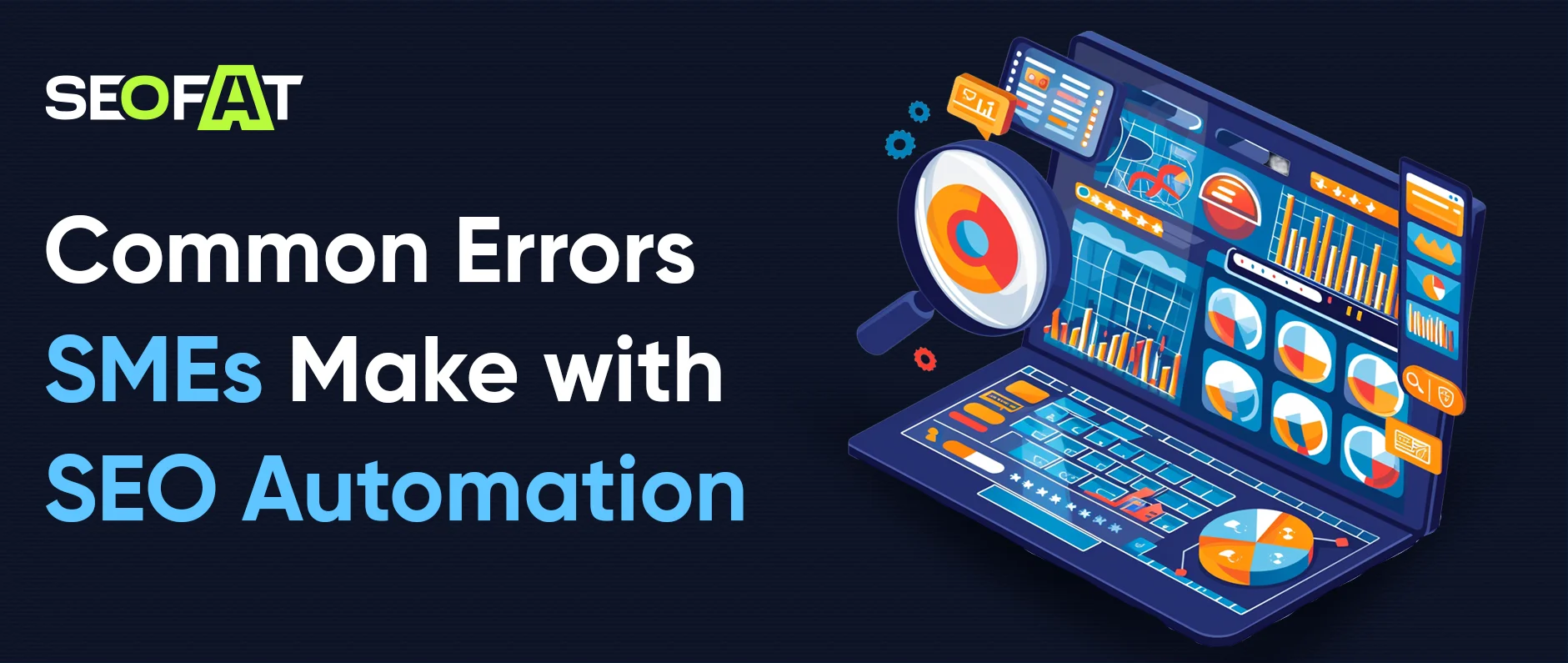When potential clients search for services like “healthcare solutions” or “industrial suppliers,” they expect results instantly. If your SME isn’t visible online, you’re missing out on opportunities before prospects even know you exist. Competing with larger rivals starts with being found.
The challenge often comes down to time and budget. SMEs rarely enjoy the privilege of an in-house SEO team. Tracking rankings, checking reports, and optimizing by hand diverts hours from productive time that could be spent operating the business.
The answer is SEO automation. The right tools let SMEs optimize their sites, track results, and compete online, without draining time or budget. This article delves into how SEO automation functions, why it's a shrewd idea for SMEs, and what tools enable it.
What is SEO Automation for SMEs?
SEO automation refers to the process of using software to manage the routine aspects of search engine optimization. Rather than manually checking rankings or investing hours in manual reporting, tools automate the process.
For SMEs, this implies:
- Increased time spent on customers and operations.
- Accurate data without the inconvenience of manual tracking.
- Scaleable strategies that expand as the business does.
It doesn't equate to stripping the human element away. People are still required for content creation, storytelling, and the voice of the brand. But routine checking, reporting, and optimizing processes can be performed in the background.
Why SEO Automation for SMEs Is a Game-Changer
 Large enterprises have entire departments full of experts. SMEs don't. Automation bridges that gap.
Here's why it matters:
Large enterprises have entire departments full of experts. SMEs don't. Automation bridges that gap.
Here's why it matters:
- Saves time: Small teams will not have to spend hours toiling through spreadsheets.
- Keeps SEO consistent: Automatically tracking and monitoring rankings, backlinks, and overall health of the site.
- Fewer errors: Automated tools can find issues that humans would miss.
- Levelling the playing field: Without an expansive budget, SMEs can compete locally and sometimes outrank larger businesses.
For instance, a family-owned dental clinic can utilize automated SEO dashboards to track appointment-based keyword positions. Rather than spending money on biweekly manual reports, automation refreshes data daily, saving effort and money.
Not all platforms are designed for SMEs. Some are too expensive or too complicated. The trick is to choose the ones that are easy, efficient, and based on actual business needs.
1. Morningscore
Morningscore is an SEO gamified platform that simplifies reporting and makes it fun. It offers SEO health scores, keyword tracking, and backlinks in a simple, newbie-friendly dashboard.
- Progress based on scores: Motivates small teams.
- Newbie-friendly: Suitable for SMEs lacking extensive SEO knowledge.
- Reporting simplified: Allows easy tracking of SEO without clogging data.
2. Serpstat
Serpstat is an affordable, one-stop SEO tool that strikes a balance between cost and capability. It helps with keyword tracking, audits, and competitor research, so it's a suitable option for SMEs.
- Cost-effective: More affordable than big enterprise tools while offering robust features.
- One-stop system: Provides keyword research, site audits, and competitor checkups.
- Scalable: The perfect tool for an SME that wishes to add marketing spend gradually, without spending too much upfront.
3. Mangools
Mangools has a clean, minimalist interface. It's great for small businesses with content-driven SEO plans.
- KWFinder: Facilitates finding profitable long-tail keywords.
- SERPWatcher: Tracks rankings with simplicity.
- Non-technical friendly: Perfect for business owners who are not technically inclined.
4. SEMrush
SEMrush is among the most used SEO tools, with extensive features. More expensive, but great for SMEs with aspirations to grow quickly and spend more.
- Holistic features: Includes technical SEO, content, backlinks, and comparative analysis of competitors.
- Insights packed with data: Ideal for aggressive growth plans.
- Ideal for growing SMEs: Too much for extremely small businesses, but extremely useful for medium-sized companies.
How SEO Automation Benefits Various Types of SMEs
Automation is not a one-size-fits-all. Here's how it translates by industries:
Local Retail Stores
- Monitor keywords such as "grocery near me" or "cheap shoes in [city]."
- Respond promptly to feedback with automated review monitoring.
- Focus on in-store visits and local map ranking.
Clinics and Healthcare
- Automate compliance-compliant content audits.
- Monitor patient-centric keywords such as "pediatric clinic near me."
- Measure leads from appointment forms using dashboards.
Hospitality and Restaurants
- Automate Google and Yelp reputation management for reviews.
- Utilize ranking tools for "best pizza in [city]" or "family-friendly hotel."
- Automatically monitor seasonal traffic trends.
Service-Based SMEs (Plumbers, Electricians, Agencies)
- Automate tracking of leads (calls and form fills).
- Monitor service-specific term rankings.
- Utilize automated reporting to demonstrate ROI clearly.
Best Practices in SEO Automation
SEO automation is strong, but it works only if combined with intelligent habits. Most SMEs fall into the trap of believing that tools will substitute for strategy. In fact, tools should liberate your time so you can concentrate on strategy, content, and customer experience. What follows are practices that make automation work for you, rather than against you.
Automate the Repetitive, Not the Creative
Tools shine when handling repetitive tasks like audits, keyword checks, and performance reporting. These jobs can eat up hours each week, and automation ensures they’re done consistently without human error.
But don’t confuse efficiency with creativity. A tool can tell you which keywords are trending, but it can’t capture your brand’s voice or tell your story. That part must stay human.
For instance, an SME hospital might utilize an SEO automation tool to manage patient lead reports and track weekly keywords. At the same time, their internal team works on creating genuine blogs that establish credibility with nearby patients.
Make Dashboards Simple
Not more data is always better. Too much information actually results in confusion and decision paralysis. SMEs are best served when dashboards only concentrate on three key metrics:
- Traffic: Are visitors coming to your website?
- Conversions: Are people converting to leads or customers?
- Rankings: Are You Showing Up for the Correct Search Terms?
An uncluttered dashboard keeps your staff on target. Automation tools eliminate vanity metrics and focus on what matters most: calls, bookings, and leads.
Set Alerts
SEO changes. One week you're in the top three, and the next week an algorithm update drops you. That's why real-time notifications are vital.
Ranking decline, broken links, or website errors can lose an SME traffic and revenue if not picked up. With smart notifications enabled, you can fix small issues before they become a loss of business.
Review Regularly
Automation is not a “set it and forget it” process. Weekly or monthly check-ins ensure that automation aligns with your goals. Data without action is just noise.
For instance, if your dashboards show steady traffic but no conversions, the problem may be your landing page design. Tools provide the “what”; your strategy team offers the “why” and “how to fix it.”
Pair with Content Planning
Automated SEO software is effective in optimizing existing content. They can't, however, produce new and engaging materials without your efforts. That's where SMEs have to strike a balance between automation and regular content posting.
New blog posts, refreshed service pages, and resource pieces are what make you applicable in search engines and customers' minds. Automation can inform your content plan by highlighting opportunities, but execution should stay human.
Common Errors SMEs Make with SEO Automation
 Even the most superior tools can fail if misused. Here's what not to do:
Even the most superior tools can fail if misused. Here's what not to do:
- Too many tools: More is less. Use only 2–3 essential tools addressing crucial issues.
- Neglecting local SEO: Local businesses are dependent on neighborhood clients.
- Dependence solely on automation: Machines cannot match human imagination.
- Failing to measure ROI: SMEs need to link SEO activities to actual leads and sales.
Example: A diner downtown, proudly sitting in the number one spot in search results, but not tracking how many table reservations are coming in through SEO, is losing the point. The true victory is customer acquisition, not vanity.
Future of SEO Automation for SMEs
SEO automation just keeps getting smarter. AI-powered tools will soon offer predictive analytics, auto-content suggestions, and even wiser competitor monitoring.
For SMEs, the bottom line is obvious: automation will continue to bring costs down, making SEO more within reach even for the tiniest businesses.
But human touch will not become irrelevant. Customers relate to genuine stories, useful blogs, and local trust indicators.
Final Thoughts: How SEOFAT Helps SMEs
SEOFAT helps SMEs streamline their SEO efforts through advanced automation tools. By automating tasks like keyword tracking, on-page optimization, backlink monitoring, and performance reporting, SEOFAT allows small and medium businesses to save time, reduce manual effort, and maintain consistent SEO growth. This ensures that SMEs can focus on expanding their business while their online visibility improves steadily and efficiently.
If you’re ready to save time and grow smarter online, start with SEOFAT today.

 Large enterprises have entire departments full of experts. SMEs don't. Automation bridges that gap.
Here's why it matters:
Large enterprises have entire departments full of experts. SMEs don't. Automation bridges that gap.
Here's why it matters:
 Even the most superior tools can fail if misused. Here's what not to do:
Even the most superior tools can fail if misused. Here's what not to do:






